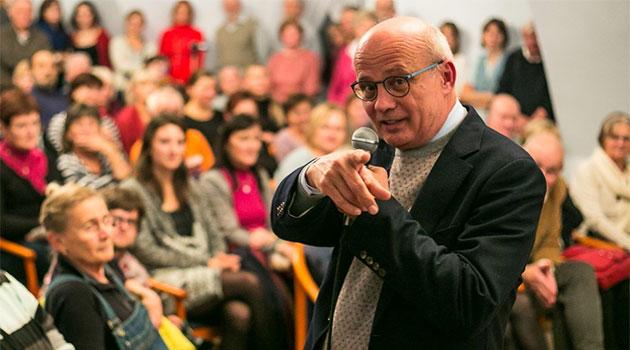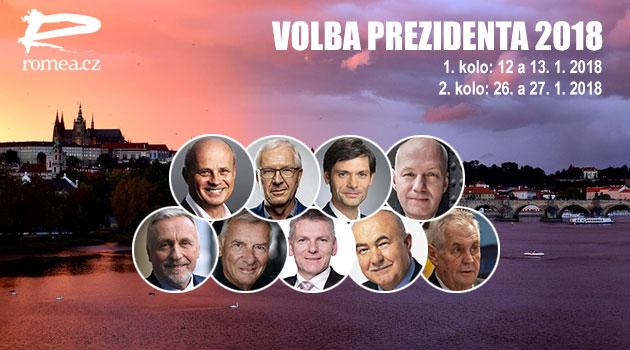Czech presidential candidate welcomes buyout of farm on site of former concentration camp for Roma

Friday will be the first day of voting in the Czech Republic’s presidential elections. The first round of voting will run from 12-13 January, with voters choosing from a slate of nine candidates, and an eventual second round will take place on 26-27 January.
News server Romea.cz has asked several questions of all the candidates on Romani-related subjects and is publishing the responses received in order. The third candidate to respond to our questions was Michal Horáček.
Horáček was one of the first people to register as a challenger to the incumbent, Czech President Zeman. He announced his candidacy in the autumn of 2016.
He is paying for his presidential campaign himself. He first came to prominence as the co-founder of the Fortuna betting agency, which he sold after 15 years for CZK 2.4 billion [EUR 94 million].
The Czech public associates this candidate with the democratic transition of 1989 and his direct political involvement in those events. He was a co-founder of the MOST (BRIDGE) initiative, the aim of which was to bring the Prime Minister of the Czechoslovak Socialist Republic to the negotiating table with representatives of independent civic initiatives.
The effort was successful and undoubtedly contributed to the anti-totalitarian revolution taking place peacefully and rapidly – the Velvet Revolution, as it was called. Horáček has also long collaborated with singers such as Petr Hapka or Hana Hegerová, writing original material for them.
The candidate has also published in prestigious international publications such as Bloodstock Breeders’ Annual Review or The British Racehorse. In 1996 he earned a Bachelor’s degree from Charles University’s Institute for the Foundations of Education, followed by a Master’s degree in anthropology in 2007.
Horáček also earned a PhD in 2011. He is in a second marriage and has three children.
Q: The Czech state recently concluded a contract to buy the pig farm in Lety u Písku that is standing on the site of a former concentration camp for Romani people. Is that good news, in your view? Do you agree with the previous Government’s step?
A: A place where people have been mistreated should be occupied by a memorial, not a pig farm. I said that in the past and I am saying it now. I welcomed the previous Government’s step.
Q: In your view, does the Czech Republic need the law on social housing that was not adopted during the previous electoral period, despite the promises of the previous Government to adopt one?
A: Yes it does. I have publicly repeatedly expressed my views in favor of adopting such a law and I have criticized politicians for not managing to adopt one during the previous Parliament despite their promises. The trafficking in poverty in the excluded localities is terrible and that law could restrict it.
Q: Are you in favor of remaining in the European Union or leaving it? Are you in favor of adopting the euro?
A: We unequivocally must remain in the EU. Leaving it would mean we would fall into insignificance, and that would harm us extraordinarily. As far as the euro goes, it’s primarily a matter for the Government, which has said it will not establish a deadline by which to adopt it. One day we will have to adopt it because we are bound by the accession agreement to do so. However, that question is not the main order of the day at this moment and I will not be working towards it.
Q: Whom would you give state honors to if you were to become head of state? Do you know of any Romani figures who deserve such an honor?
A: Certainly – I have mentioned Zdeňka Demeterová more than once. I met her in the excluded locality of Varnsdorf. She is a Romani woman who attended a “special school” without ever learning how to read or write. She grew up in a ghetto. Through her own diligence, she has taught herself what she needs to know, and today she is used to working with computers and she has completed a field social worker course. Today she herself is aiding people in the excluded localities. That is immeasurably difficult work and those who do it get abuse from both sides, from the Roma and from the whites. She’s not giving up, though. Another example is the director of the Museum of Romani Culture, Jana Horváthová. She certainly deserves honors for her work.
Q: What is your view of affirmative action for Romani people, for example, the scholarships provided to Romani high school and college students?
A: Since I have personally contributed to such scholarships for several Romani students, my opinion is probably clear.
Q: If you were to become head of state, would you announce a partial prisoner amnesty the way Czech President Václav Klaus did?
A: Any measures that are across-the-board are always problematic. I would grant individual pardons in justified cases, but never an amnesty.
Q: Does the Czech Republic need inclusive education, in your view? How do you assess the first year of inclusion in practice?
A: I support the idea of inclusion. However, I have also met with many educators and other experts in education, so I know that the practical implementation of inclusion in the primary schools frequently lags behind and creates no small amount of problems for those whom it is basically intended to aid, i.e., the handicapped children. I think we must generally proceed much more sensitively on this issue.
